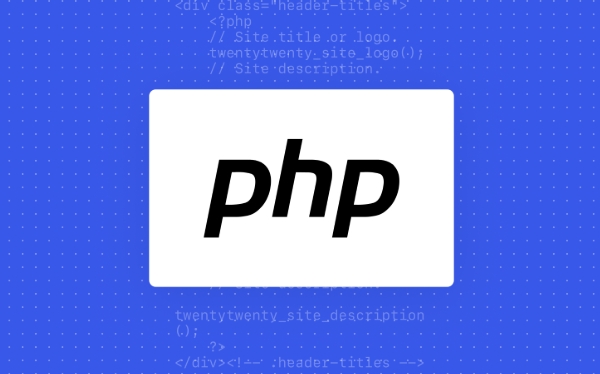To define a function that accepts referenced parameters in PHP, you need to prepend the parameter with &: function increment(&$number) { $number ; } when defining the function. 1. When defining a function, add the & symbol before the parameter name to enable reference passing; 2. When calling the function, do not need to add &, just pass in the variable directly; 3. Do not use reference passing on the literal, otherwise an error will be reported; 4. Reference passing is suitable for situations where external variables need to be modified, but abuse should be avoided to keep the code clear; 5. PHP also supports returning references, but should be used with caution. For example, after calling increment($num), the value of $num will be modified internally by the function and preserved externally.

In PHP, by default, the parameters of the function are passed by value, which means that the modification of the variables inside the function will not affect the original variables outside. But if you want the function to modify the variables passed in and these modifications can be reflected outside the function, you need to use pass by reference .

PHP allows you to specify that the parameter is passed in reference by preceding the parameter by specifying the & symbol when defining a function.

How to define a function that accepts referenced parameters?
When defining a function, add & before the parameter name:
function increment(&$number) {
$number ;
}When called in this way, the variables passed in will be treated as references:

$num = 5; increment($num); echo $num; // Output 6
As you can see, the value of $num is changed in the function, and this change is retained outside the function.
What should be noted is:
- Reference passes must be declared when the function is defined and cannot be temporarily decided upon when the call is called.
- It is not recommended to pass references to literals (such as numbers and direct strings) as an error will be triggered.
How to correctly use reference parameters when calling a function
When calling a function, you do not need to add & before the parameters, you only need to make sure that the reference parameters have been declared in the function definition.
$value = 10; increment($value); // Correct: no need to add & when calling
But if you see a writing method like this in the old version of PHP code:
increment(&$value); // Obsolete writing
This was intended to explicitly referencing passes in earlier versions, but was no longer needed in PHP 5 and later, and this writing is now considered outdated and may even report an error.
Common misunderstandings and precautions
Not all parameters need to be passed by reference
If you just want to read the value of a variable instead of modifying it, there is no need to use a reference. Abuse of references will make the code difficult to understand and maintain.Will reference passes affect performance?
Generally speaking, reference passes can save memory, especially when dealing with large arrays or objects. However, PHP has been optimized internally (such as copy-on-write), so in most cases, there is no need to deliberately use references to improve performance.Returning a quote is also feasible
In addition to parameters, PHP also supports returning references, but this is more complicated and you need to be particularly careful when using it. For example:function &getReference() { static $var = 0; return $var; } $ref = &getReference(); $ref = 10; echo getReference(); // Output 10
Summarize
The key to implementing reference parameter transfer in PHP is to add
&to the parameter when the function is defined. This method is suitable for situations where you need to modify external variables inside the function. Be careful not to abuse it, keeping the code clear and secure is more important.Basically that's it.
The above is the detailed content of How to pass arguments by reference in a PHP function?. For more information, please follow other related articles on the PHP Chinese website!

Hot AI Tools

Undress AI Tool
Undress images for free

Undresser.AI Undress
AI-powered app for creating realistic nude photos

AI Clothes Remover
Online AI tool for removing clothes from photos.

Clothoff.io
AI clothes remover

Video Face Swap
Swap faces in any video effortlessly with our completely free AI face swap tool!

Hot Article

Hot Tools

Notepad++7.3.1
Easy-to-use and free code editor

SublimeText3 Chinese version
Chinese version, very easy to use

Zend Studio 13.0.1
Powerful PHP integrated development environment

Dreamweaver CS6
Visual web development tools

SublimeText3 Mac version
God-level code editing software (SublimeText3)
 PHP Variable Scope Explained
Jul 17, 2025 am 04:16 AM
PHP Variable Scope Explained
Jul 17, 2025 am 04:16 AM
Common problems and solutions for PHP variable scope include: 1. The global variable cannot be accessed within the function, and it needs to be passed in using the global keyword or parameter; 2. The static variable is declared with static, and it is only initialized once and the value is maintained between multiple calls; 3. Hyperglobal variables such as $_GET and $_POST can be used directly in any scope, but you need to pay attention to safe filtering; 4. Anonymous functions need to introduce parent scope variables through the use keyword, and when modifying external variables, you need to pass a reference. Mastering these rules can help avoid errors and improve code stability.
 How to handle File Uploads securely in PHP?
Jul 08, 2025 am 02:37 AM
How to handle File Uploads securely in PHP?
Jul 08, 2025 am 02:37 AM
To safely handle PHP file uploads, you need to verify the source and type, control the file name and path, set server restrictions, and process media files twice. 1. Verify the upload source to prevent CSRF through token and detect the real MIME type through finfo_file using whitelist control; 2. Rename the file to a random string and determine the extension to store it in a non-Web directory according to the detection type; 3. PHP configuration limits the upload size and temporary directory Nginx/Apache prohibits access to the upload directory; 4. The GD library resaves the pictures to clear potential malicious data.
 Commenting Out Code in PHP
Jul 18, 2025 am 04:57 AM
Commenting Out Code in PHP
Jul 18, 2025 am 04:57 AM
There are three common methods for PHP comment code: 1. Use // or # to block one line of code, and it is recommended to use //; 2. Use /.../ to wrap code blocks with multiple lines, which cannot be nested but can be crossed; 3. Combination skills comments such as using /if(){}/ to control logic blocks, or to improve efficiency with editor shortcut keys, you should pay attention to closing symbols and avoid nesting when using them.
 How Do Generators Work in PHP?
Jul 11, 2025 am 03:12 AM
How Do Generators Work in PHP?
Jul 11, 2025 am 03:12 AM
AgeneratorinPHPisamemory-efficientwaytoiterateoverlargedatasetsbyyieldingvaluesoneatatimeinsteadofreturningthemallatonce.1.Generatorsusetheyieldkeywordtoproducevaluesondemand,reducingmemoryusage.2.Theyareusefulforhandlingbigloops,readinglargefiles,or
 Tips for Writing PHP Comments
Jul 18, 2025 am 04:51 AM
Tips for Writing PHP Comments
Jul 18, 2025 am 04:51 AM
The key to writing PHP comments is to clarify the purpose and specifications. Comments should explain "why" rather than "what was done", avoiding redundancy or too simplicity. 1. Use a unified format, such as docblock (/*/) for class and method descriptions to improve readability and tool compatibility; 2. Emphasize the reasons behind the logic, such as why JS jumps need to be output manually; 3. Add an overview description before complex code, describe the process in steps, and help understand the overall idea; 4. Use TODO and FIXME rationally to mark to-do items and problems to facilitate subsequent tracking and collaboration. Good annotations can reduce communication costs and improve code maintenance efficiency.
 Quick PHP Installation Tutorial
Jul 18, 2025 am 04:52 AM
Quick PHP Installation Tutorial
Jul 18, 2025 am 04:52 AM
ToinstallPHPquickly,useXAMPPonWindowsorHomebrewonmacOS.1.OnWindows,downloadandinstallXAMPP,selectcomponents,startApache,andplacefilesinhtdocs.2.Alternatively,manuallyinstallPHPfromphp.netandsetupaserverlikeApache.3.OnmacOS,installHomebrew,thenrun'bre
 How to access a character in a string by index in PHP
Jul 12, 2025 am 03:15 AM
How to access a character in a string by index in PHP
Jul 12, 2025 am 03:15 AM
In PHP, you can use square brackets or curly braces to obtain string specific index characters, but square brackets are recommended; the index starts from 0, and the access outside the range returns a null value and cannot be assigned a value; mb_substr is required to handle multi-byte characters. For example: $str="hello";echo$str[0]; output h; and Chinese characters such as mb_substr($str,1,1) need to obtain the correct result; in actual applications, the length of the string should be checked before looping, dynamic strings need to be verified for validity, and multilingual projects recommend using multi-byte security functions uniformly.
 Learning PHP: A Beginner's Guide
Jul 18, 2025 am 04:54 AM
Learning PHP: A Beginner's Guide
Jul 18, 2025 am 04:54 AM
TolearnPHPeffectively,startbysettingupalocalserverenvironmentusingtoolslikeXAMPPandacodeeditorlikeVSCode.1)InstallXAMPPforApache,MySQL,andPHP.2)Useacodeeditorforsyntaxsupport.3)TestyoursetupwithasimplePHPfile.Next,learnPHPbasicsincludingvariables,ech






